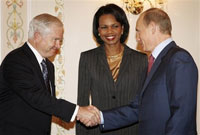Putin makes Condoleezza Rice laugh in Moscow
Before the start of the tense talks with U.S. officials Condoleezza Rice and Robert Gates in Moscow, President Putin threatened to pull Russia out of a Cold War-era treaty limiting intermediate range missiles unless it was extended to countries beyond the United States and Russia, which are now the only signatories.

Addressing U.S. Secretary of State Condoleezza Rice and U.S. Defense Secretary Robert Gates, Putin appeared to mock the U.S. missile defense plan, which is at the center of a tangle of arms control and diplomatic disputes between the former adversaries.
"Of course we can sometime in the future decide that some anti-missile defense system should be established somewhere on the moon," Putin said, according to an English translation. "But before we reach such arrangements we will lose the opportunity for fixing some particular arrangements between us."
Later, at the start of a meeting with Rice and Gates, Russian Foreign Minister Sergey Lavrov said the Americans had presented "detailed proposals" to Putin on missile defense and arms control and a treaty on reducing conventional forces in Europe.
He offered no details but said the Russian government is ready to seek compromise, noting in particular Putin's eagerness to expand the treaty on intermediate missiles.
But both he and Rice said the two countries were committed to bridging those gaps.
"I know that we don't always see eye-to-eye on every element of the solutions to these issues," Rice said. "Nonetheless, I believe we will do this in a constructive spirit, that we will make progress during these talks as we continue to pursue cooperation."
The Russian government sees the U.S. missile defense plan, which Washington describes as a hedge against the threat of missile attack from Iran, as a worrisome step toward weakening Russian security. It has been a long-standing dispute, and Putin's remarks seemed to raise the level of tensions.
Rice and Gates appeared taken aback at the forcefulness of Putin's remarks, which were made in the presence of American and Russian news media before they began a closed-door meeting around an oval table in an ornate conference room at his country house outside the capital.
"We will try to find ways to cooperate," Rice responded, looking at notes she had jotted while frowning at Putin as he spoke from what appeared to be a prepared text.
After keeping Rice and Gates waiting for 40 minutes, Putin began the session with a lengthy monologue in which he said Russia might have to abandon the 1987 missile treaty with the United States if it is not expanded to constrain other missile-armed countries.
Referring to the Intermediate-range Nuclear Forces treaty negotiated between the United States and the former Soviet Union, Putin said it must be applied to other countries, including those "located in our near vicinity." He did not mention any by name.
Putin said the treaty must be made "universal in nature."
Rice appeared to be satisfied with the talks after the meeting was over. She was smiling and joking while talking to Russian officials.
Gates said the Pentagon was ready to intensify a dialogue on the matter, but he did not directly comment on the missile defense dispute.
Putin also has threatened to suspend Russian adherence to another arms control treaty, known as the Conventional Forces in Europe pact, which limits deployments of conventional military forces. Moscow wants it to be revised in ways that thus far have been unacceptable to U.S. and European signatories.
Shortly before the talks with Putin, Lavrov had strolled into the house's billiards room, where American reporters had gathered, for a cigarette break. He was asked whether he expected any breakthroughs in the talks and offered a perhaps prophetic quip.
"Breaks, definitely. Through or down, I don't know," he said.
The Pentagon plans to install 10 missile interceptors in Poland, linked to a missile tracking radar in the Czech Republic. The Pentagon says the system will provide some protection in Europe and beyond for long-range missiles launched from Iran, but Russia believes the system is a step toward undermining the deterrent value of its nuclear arsenal.
Rice told reporters on Thursday on her flight to Moscow that the U.S. would go ahead with the program as planned.
"We've been very clear that we need the Czech and Polish sites," she said, although there's "considerable interest" in Russian ideas for cooperation such as sharing a Soviet-era tracking station in Azerbaijan.
Subscribe to Pravda.Ru Telegram channel, Facebook, RSS!




